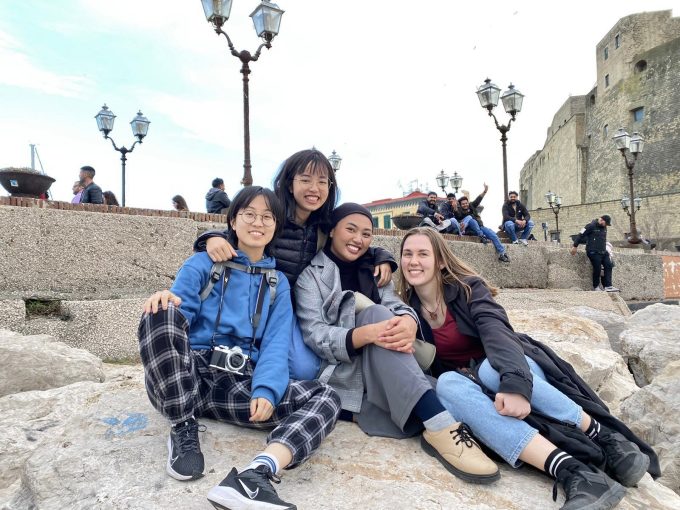
SDGs 4: “Quality Education”
Vina Aulia, a Cultural Anthropology student from the Faculty of Cultural Sciences, Universitas Gadjah Mada had the opportunity to participate in a student exchange program at the University of Naples “L’Orientale” for one semester through the Erasmus+ program. This program, initiated by the European Union, provides funding for students, educators, and higher education institutions to develop international cooperation, enhance educational quality, and promote intercultural understanding.
Living far away from Indonesia was a new experience for her, especially as it was her first time traveling to a country with a culture vastly different from Indonesia. Through this article, she aims to share her amazing student exchange experience in a country often referred to as the Land of Pizza and Gelato.
In the first few weeks, she experienced culture shock due to various customs and different cultures. In Indonesia, rice is easily found, unlike in Italy, where bread, pasta, and pizza are the staple food. Rice is hardly found, and its prices are expensive. One of Napoli’s famous dishes is Pizza Margherita. Interestingly, the three main components of this pizza, namely tomato sauce, mozzarella, and basil leaves, symbolize the Italian flag’s colors of red, white, and green. Additionally, this food is associated with the symbolic identity of the unity of Italy.
Talking about seasons, she had to adapt to the temperature differences compared to her life in Indonesia. When she arrived in February, Italy was still in winter. Although not as cold as in other northern Italian cities, she found it quite freezing. In the morning, the temperature could drop to 5 degrees Celsius, requiring Vina to layer her clothing every day.
For many, Napoli is often associated with being a dirty, poor city with high crime rates. However, living there for an extended period made her realize that Napoli also serves unique aspects rarely found in other cities. The friendly locals with their distinctive high-pitched intonation, authentic pizza Margherita, narrow streets adorned with Napoli football club ornaments, the ever-present Mount Vesuvius, and the ancient architecture left her in awe. The unique blend of European and Mediterranean cultures even earned Napoli recognition as a UNESCO World Cultural Heritage site.
While accustomed to living in a predominantly Muslim country, Vina experienced life as a minority in Napoli, where the majority of the population is Christian-Catholic. She learned that Napoli has at least 500 churches from over centuries, with mosques being scarce, and small prayer rooms mostly visited by immigrants from Bangladesh or India. Despite being a Muslim minority, she never faced discrimination. On the contrary, locals often praised her for wearing a hijab and having an exotic Asian appearance. She also built friendships with many Indonesian priests and nuns serving in Napoli, considering them as part of her extended family.
Another remarkable experience that left a lasting impression on her was Napoli’s local football club celebration culture, known as “scudetto,” a celebration for Italian football clubs winning the Serie A trophy. Last year, Napoli emerged victorious after 33 years. Attending the scudetto celebration with her Indonesian friends, she witnessed not only the joy of the Napoli community but also an indescribable atmosphere of happiness and emotion. From children to the elderly, everyone celebrated the scudetto with joy. That night, the entire city of Napoli felt warm with happiness, and full decorated by red-flaming fireworks and sparklers.
Living in Italy became one of the most precious experiences in her life. She also had the opportunity to visit various other European countries, including Hungary, the Czech Republic, Switzerland, and Austria. In terms of tourism, Europe provided many benefits to students, such as discounted train tickets and free tickets to museums and historical sites. Living in Europe taught her to appreciate the cultural differences and diverse characteristics of people. She learned new perspectives from friends originating from different countries. The initial culture shock allowed her to better understand the importance of cultural adaptation for survival. Vina is grateful for this unforgettable experience and hopes that readers will also have the same opportunity.

